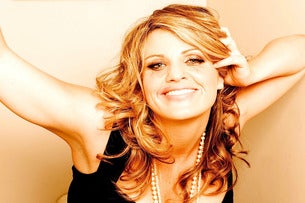More than a year on from the breakout of the #MeToo movement, even comedians who generally keep things on the lighter side cannot escape feminist issues.
Nikki Britton describes her new show as “like having a wine with your best friend, if your best friend has a more robust opinion about something than she has had in previous years”.
Among jovial anecdotes from her own life, including some dating disaster stories, in Once Bitten, Britton delves deep into issues around body image and how femininity and masculinity are perceived in society. “It’s a show that I hope is obsolete in a few years time," she says.
“It’s really interesting to me now how there’s this huge conversation about gender equality and #MeToo and there is so much incredibly positive movement towards the empowerment of and equality for women, but it feels like that fight is being put forward in a way that is masculine. I’m not saying that is the wrong way, it’s just the way that we’ve always understood is how you win.
“It’s a show that I hope is obsolete in a few years time."
“In order to do many, many things within this world, women have had to call upon the masculine traits within themselves in order to be valued, respected or listened to in those arenas… As quite a feminine woman who has been forced to apply her masculine traits more and more, I yearn for the vulnerability, the passion, the empathy and the communication that is my natural state.”
Don't miss a beat with our FREE daily newsletter
For Rose Callaghan, her latest show, 12 Rules For Life, was bred from an extreme frustration with the culture of pick-up artists and controversial internet psychologists – and one in particular, who for better or worse, was recently given a platform on Q&A.
Callaghan began to get “really bummed out” as male friends around her started to subscribe to the wisdom of a certain Canadian academic flogging his own 12 Rules For Life ranging from the groundbreaking idea that men should clean their rooms, to more insidious notions about lobsters and “this obsession with these old-school notions of what men and women are”.
She also soon noticed that the same guys who tried to get her to debate Jordan Peterson, were also trying to get her riled up about Gillette’s recent 'woke' viral advertisement: “I’ll give a shit when GilIette’s women’s razors don’t cost four times as much as men’s."
While Callaghan is an advocate for progress, she is also open to exploring why young men are drawn to controversial internet figures who denounce 'political correctness', and notes the role of privilege.
“Most journalists [and comedians] are middle-class, a lot are white, and we frame it from a middle-class white perspective… If you’re a poor white dude and all you’re hearing is ‘men get all these privileges’ and you yourself have suffered trauma, I can understand why that would piss you off.”
Changes are happening at a social level, and the topics a comedian can talk about on stage are also broadening. Line-ups are diversifying: you need only look to the smallest local stand-up nights or huge streaming services like Netflix to see a more varied bunch of comics than a decade or two ago. However Britton and Callaghan want to see the comedy game changed at an organisational, industry level to protect people when things go wrong, and give up-and-coming comedians a support network to validate experiences of harassment.
"A lot of people get burnt out by it or just leave."
“We don’t have a union or a peak body that looks out for us and I think that is what comedy really needs in Australia to try to regulate it and have there be processes to go through to say, ‘This person did something fucked,’” says Callaghan. “[The industry needs] official processes so it’s not all up to comedians to try to figure out how to deal with these situations.
“A lot of people get burnt out by it or just leave,” she continues, speaking of the pressures the industry and its strange hours can have on newcomers, especially young women and non-binary people. After the comedian Eurydice Dixon was murdered on her way home from a gig in June 2018, Callaghan noticed this burnout among her colleagues and friends, often people who knew Dixon.
“They are still feeling it [in Melbourne] now and it’s still pretty full on… You spend so much time by yourself walking home late at night, it’s just the thing that terrifies you the most.”
On the line-up front, Britton feels that things are “changing for the better” and “people who are not meeting the progress... they’re gonna be phased out real quick”. However, she’s keen to see it taken further.
“I would love to see women hosting satirical comedy shows, panel shows or late night shows… We’re seeing more funny women in those shows generally, but they’re not always in the position of power.”
















